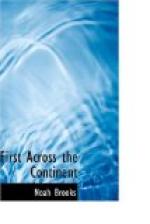“It passes through a wide valley without timber; the surrounding country consists of waving low hills, interspersed with some handsome level plains; the banks are abrupt, and consist of a black or yellow clay, or of a rich sandy loam; though they do not rise more than six or eight feet above the bed, they exhibit no appearance of being overflowed; the bed is entirely composed of a light brown sand, the particles of which, like those of the Missouri, are extremely fine. Like the dry rivers we passed before, this seemed to have discharged its waters recently, but the watermark indicated that its greatest depth had not been more than two feet. This stream, if it deserve the name, we called Bigdry (Big Dry) River.”
And Big Dry it remains on the maps unto this day. In this region the party recorded this observation:—
“The game is now in great quantities, particularly the elk and buffalo, which last is so gentle that the men are obliged to drive them out of the way with sticks and stones. The ravages of the beaver are very apparent; in one place the timber was entirely prostrated for a space of three acres in front on the river and one in depth, and great part of it removed, though the trees were in large quantities, and some of them as thick as the body of a man.”
Yet so great have been the ravages of man among these gentle creatures, that elk are now very rarely found in the region, and the buffalo have almost utterly disappeared from the face of the earth. Just after the opening of the Northern Pacific Railway, in 1883, a band of sixty buffaloes were heard of, far to the southward of Bismarck, and a party was organized to hunt them. The bold hunters afterwards boasted that they killed every one of this little band of survivors of their race.
The men were now (in the middle of May) greatly troubled with boils, abscesses, and inflamed eyes, caused by the poison of the alkali that covered much of the ground and corrupted the water. Here is an entry in the journal of May 11:—
“About five in the afternoon one of our men (Bratton), who had been afflicted with boils and suffered to walk on shore, came running to the boats with loud cries, and every symptom of terror and distress. For some time after we had taken him on board he was so much out of breath as to be unable to describe the cause of his anxiety; but he at length told us that about a mile and a half below he had shot a brown bear, which immediately turned and was in close pursuit of him; but the bear being badly wounded could not overtake him. Captain Lewis, with seven men, immediately went in search of him; having found his track they followed him by the blood for a mile, found him concealed in some thick brushwood, and shot him with two balls through the skull. Though somewhat smaller than that killed a few days ago, he was a monstrous animal, and a most terrible enemy. Our man had shot him through the centre of the lungs; yet he had




